The US and Canada look to be coordinating their probes into the alleged role of India-linked agents in the plot against two Khalistani terrorists. While India is cooperating with the US in the Gurpatwant Singh Pannun probe, it has rejected Canada's charges in the Hardeep Singh Nijjar case. This is why India is taking divergent stances.

While no senior official in the Biden administration has attacked India on the Pannun case, PM Justin Trudeau has led Canada's attack against India in the Nijjar case. (File Images)
Two similar cases involving Khalistani terrorists, but two totally different reactions from India. While India is cooperating with the US in the Pannun plot, it has junked an investigation by Canada into Nijjar's killing. But why is India's reaction so diverse in the two cases, including one that has snowballed into a diplomatic crisis?
The case in the US has to do with an attempt on the life of Gurpatwant Singh Pannun, a Khalistani terrorist and known India baiter. The US alleged that agents linked to India tried to kill Pannun. The case has progressed in court with two people indicted, and an accused being extradited.
The case in Canada has to do with Prime Minister Justin Trudeau's administration alleging that Indian officials played a role in the murder of Hardeep Singh Nijjar, a Khalistani terrorist. Nijjar was shot dead in Surrey in June last year. Other than a blame game, the only development in the case has been the recalling and expelling of diplomats.
While both the US and Canada requested India's cooperation in the Pannun and Nijjar cases, respectively, only the US seems to have provided actionable evidence to India, while Canada has gone the whole hog just on the basis of intelligence inputs. And that too, borrowed from the US.
On October 17, the US said it "appreciated" the cooperation it had received from India.
"We are satisfied with the cooperation... We appreciate the cooperation, and we appreciate them updating us on their investigation, and we update them on ours," Matthew Miller, spokesperson for the US Department of State, said. His remarks came at the Indian inquiry committee meeting with US officials regarding the foiled plot to kill Pannun in the US.
Contrast this with the recalling of the Indian high commissioner and other diplomats from Canada by India after Canada named them "persons of interest" in the Nijjar killing.
India called Canada's charges baseless and said, despite repeated requests, it didn't provide a "shred of evidence".
Canada didn't provide evidence because it had none.
Trudeau admitted that while deposing before the commission that is probing foreign interference in Canada's democratic processes.
Experts feel that the US and Canada have been coordinating in the Pannun and Nijjar cases. But there's a difference in the way they have gone about the issue.
It is the US which has in a way connected the Pannun and Nijjar cases.
The US State Department has indicted an alleged former Research and Analysis Wing (RAW) official, Vikash Yadav, for orchestrating the failed plot to kill Pannun.
The indictment says Yadav used the alias "Amanat" when communicating with his co-conspirator in the Pannun murder plot. The FBI released Yadav's pictures and said he was from Pranpura in Haryana.
The charges against Yadav were part of a second indictment that was unsealed in a New York court. His alleged co-conspirator, Nikhil Gupta, was previously charged and extradited to the US.
The latest indictment allegedly mentions that Yadav, in the US, got a real-time video of Nijjar's killing in Canada on June 18 and shared it within hours with Gupta.
It is most likely that the US shared with Canada the intel on the video that reached Yadav. The video must have originated in Canada where Nijjar was killed, but it is not clear who sent it to Yadav.
Canada, without any evidence, and with just the intel input from the US, accused agents linked to the Indian government of their role in Nijjar's killing. It went to the extent of alleging that Indian diplomats gathered input for the plots to target Khalistanis.
Canada doesn't have a specialised external spy agency like the CIA and depends on the US, its Five Eyes partner, for intelligence input. The Five Eyes is a close-knit espionage network.
The intelligence-to-evidence gap is Canada's decades-old problem and a result of tardy coordination between its Canadian Security Intelligence Service (CSIS) and the Royal Canadian Mounted Police (RCMP).
The other big difference is that while the US hasn't made damaging public statements against India, Canada, on the other hand, has made it a diplomatic issue. Trudeau's critics blame his administration's stance on the issue for his domestic political desperation.
"The way that the US has handled the case is very responsible," said Michael Kugelman, director of the Wilson Center's South Asia Institute, at an India Today TV debate. He said senior US officials haven't been making statements in public on the issue. This is in stark contrast to what the Trudeau government has been doing.
While the US seems to have worked to gather evidence and even got Gupta extradited by the Czech Republic, Canada is shooting in the dark. That's exactly the reason why India is cooperating with the US, and not taking allegations by Canada seriously. Because, after all, they are allegations without any actionable evidence.
Published By:
Sushim Mukul
Published On:
Oct 21, 2024

 1 month ago
1 month ago



















